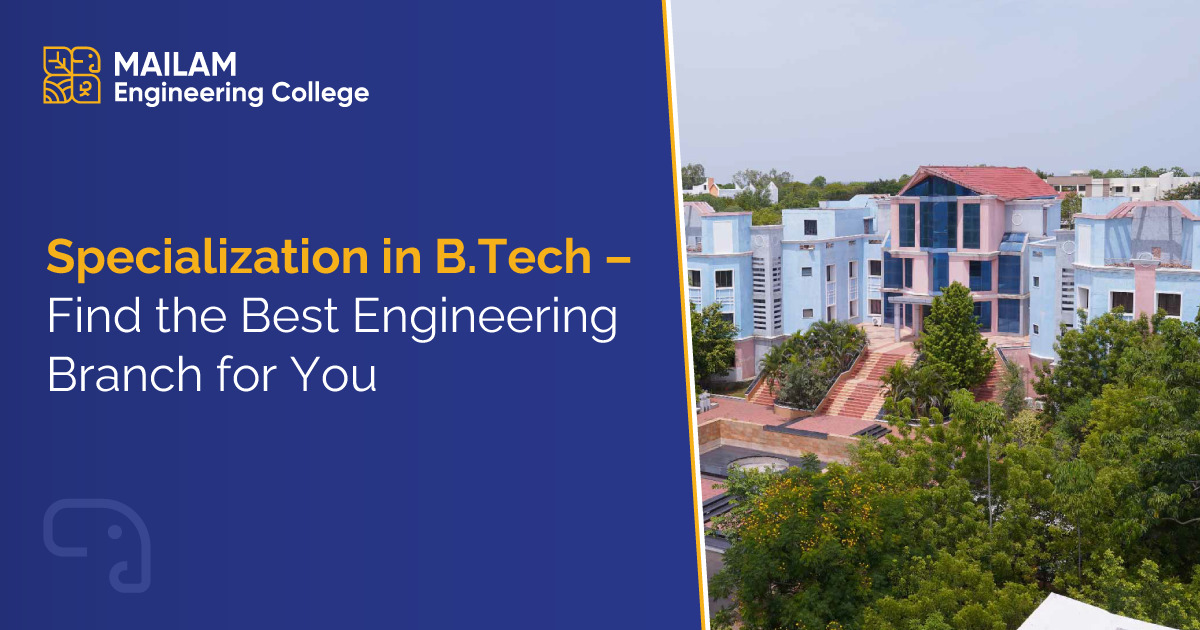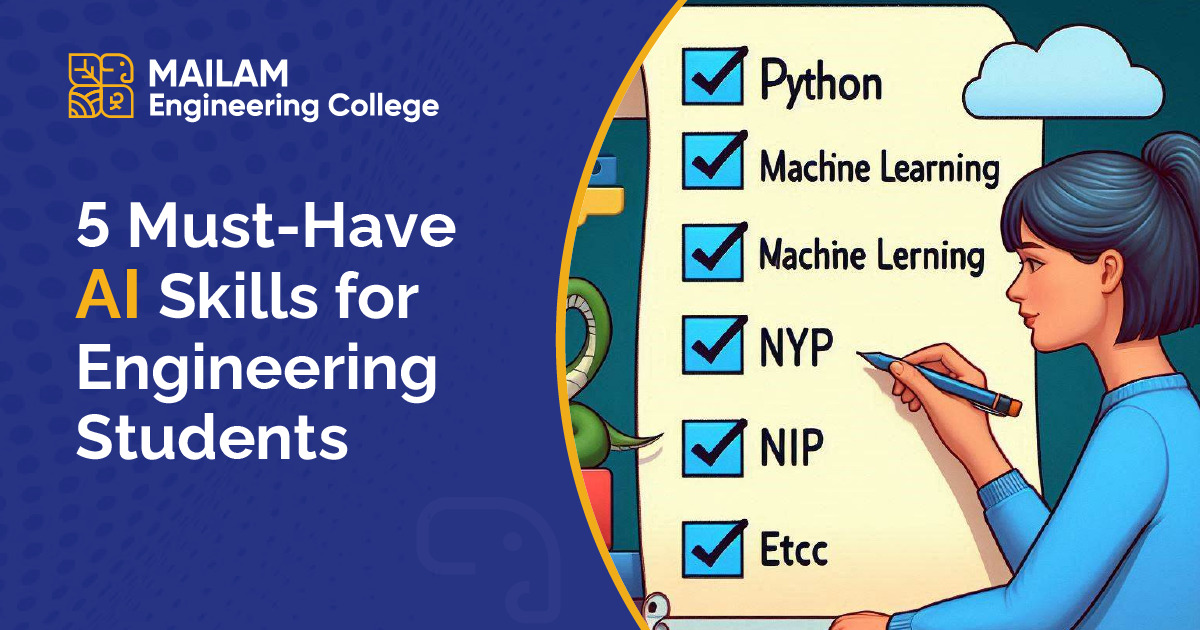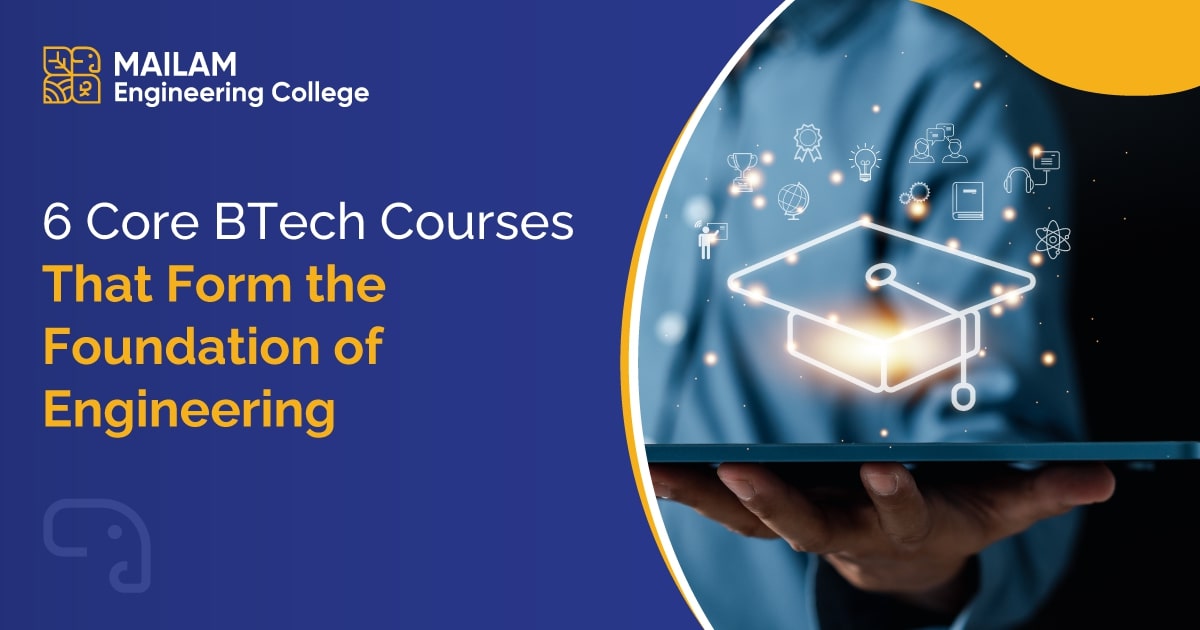Introduction
Starting a Bachelor of Technology (BTech) journey is an adventure that paves the way for a fulfilling career in the field of engineering.
Enrolling on suitable courses (BTech) can help you establish a knowledge base and develop essential skills to thrive in this ever-evolving industry.
Thus, this article will delve into 6 Core BTech Courses That Form the Foundation of Engineering. Each course combines concepts with hands-on practice, preparing you for the challenges and prospects.
For those aspiring to succeed in engineering, this article will help you learn about BTech and its specialisation to kickstart your journey.
Why You Should Choose B.Tech
The eight reasons for choosing BTech I are listed here,
- High Demand for Engineers
Engineering is not only a discipline but also a noble profession that is in demand in every field of today’s job market and, hence, has no end to its demand.
- Diverse Specializations
B. Tech programs have many branches, such as Information Technology, Artificial Intelligence, Data Science, and many more, depending on the student’s choice.
- Good Salary Packages
The research revealed that engineering students have the opportunity to gain a better salary package and that there are many instances whereby the holder of an engineering certification can easily earn a high salary.
- Strong Job Security
Engineers are generally secure in their jobs because the spheres they introduce, like technology and infrastructure, are vital.
- Opportunities for Innovation
B.Tech programmes build creativity, and people can find solutions to problems; what one gets to do is quite fascinating.
- Career Growth
The engineering profession clearly defines career progression models and possible career advancement opportunities for managers and leaders.
- Global Opportunities
Some skills employed in engineering occupations are recognised, fostered, and celebrated worldwide, enhancing mobility and the opportunity to work in other countries.
- Foundation for Further Studies
Thus, employment opportunities through higher studies in M. Technology or MBA directly result from the B. Tech degree.
.
How to Choose the Right BTech Course for You
1. Reflecting on your interests and strengths
Remember to prioritise your interests and strengths while choosing a BTech course. Do you enjoy programming? Are you fascinated by AI? Are You Business-Savvy? This will help you contemplate your choices.
2. Exploring Course Curriculums
Research the topics and assignments of individual courses. Knowing what you will learn is essential for judging whether it aligns with your interests and future career objectives. Visit university websites, Schedule calls with current students or alums, or examine course syllabuses to get a clear picture.
3. Evaluating Faculty and Resources
The quality of education can significantly impact your learning experience. Research the faculty’s expertise and the resources available at potential institutions. Strong mentorship and access to cutting-edge labs and technology can enhance your education and provide valuable hands-on experience.
4. Considering Internship and Placement Opportunities
Internships and placement programs are crucial for gaining real-world experience and securing a job post-graduation. Investigate the internship opportunities provided by the universities and their placement records. A suitable placement cell can bridge the gap between education and industry.
5. Assessment of Faculty and Resources
The quality of learning massively depends on the educational system’s quality. Learn about the faculty and resources available at Research Universities.
6. Internship and Placement Opportunities
Part-time work and placement schemes are needed to get a glimpse of real-life experience and give insight into how your career might shape up right after college. Check the university internship offers and their placement records. A suitable placement cell can act as the bridge between education and industry for those who are seeking jobs in IT.
7. Assessing Financial Investment
Check the course fee and ROI of coursework. Although some courses may be more costly, this could lead to more excellent job opportunities and increased entry-level salaries. Consider tuition assistance, financial aid, and part-time work to help pay for your.
8. Future Career Prospects
Think about the career opportunities each course offers. Research the job market and potential growth in the field. Choosing a course with solid prospects can set you up for long-term success.
6 Core BTech Courses That Form the Foundation of Engineering
1. Bachelor of Technology (B.Tech) in Information Technology
Definition and Scope
The B.Tech IT degree program primarily focuses on applying and managing computer technology, software development and networking. It is about processing, storing and securing information central to today’s digital world.
Key Subjects Covered
Under IT, you will cover programming, databases, networks, and web technologies. Professors will train you to learn cyber security, software engineering, and cloud computing.
Career Opportunities
Some graduates may enter careers such as software developers, network engineers, IT consultants, or cyber security analysts. This field has always been an excellent choice for anyone who loves tech, considering the number of people getting more involved with Information Technology.
2.B.Tech Artificial Intelligence and Data Science
Definition and Scope
Artificial intelligence (AI) and data science are transforming technology use. This course’s algorithmic studies for machine learning systems merge with data analysis to produce intelligent machines.
Key Subjects Covered
You will study areas like Big Data Technologies, including data mining and machine learning neural networks. The curriculum also covers Statistics, Programming, and AI Ethics.
Career Opportunities
Data science is one career path one may choose after this course, with AI engineers and even research scientists being other possibilities. There’s plenty of money to be made in AI and data science, and employment may begin at any level.
3. B.Tech Computer Science and Business Systems
Definition and Scope
This course serves as a bridge between computer science and business management. It teaches students the technical skills of computer science and strategic thinking in business systems.
Key Subjects Covered
Here, you will take courses in business analytics, information systems, enterprise resource planning (ERP), and programming. You will also learn management principles and financial accounting.
Career Opportunities
Some jobs for graduates from this programme include business analysts, IT managers, systems analysts or software engineers. B.Tech Computer Science and Business Systems is for those who wish to blend their love for technology with sound knowledge to run a successful enterprise.
4.B.Tech Computer Science and Engineering (Information Security)
Definition and Scope
B.Tech Computer Science and Engineering (Information Security) software development degree course focuses on securing data and systems against cyber threats. The syllabus emphasises the creation of secure systems while exploring cybersecurity’s guiding principles.
Key Subjects Covered
Our classes include cryptography, network security, ethical hacking or security protocols that you will study. Additionally, there are topics such as risk management, cybersecurity laws, etc.
Career Opportunities
After completing this program, there are careers that somebody can pursue: information security analysts, ethical hackers, cybersecurity consultants, and IT auditors. Because of increased online threats, people trained in this field are in high demand.
5.B.Tech in Computer Science and Engineering (Artificial Intelligence and Machine Learning)
Definition and Scope
This course aims to study AI and Machine Learning (ML) as part of the broader field of computer science. It focuses on designing and building intelligent systems that learn and adapt.
Key Subjects Covered
Core subjects covered are machine learning algorithms, deep learning, computer vision, natural language processing, programming, and AI ethics.
Career Opportunities
Possible job titles include AI engineers, ML researchers, data scientists, and software developers. This program teaches highly sought-after skills BTech students can apply across multiple industries.
6. B.Tech in Computer Science and Engineering (Blockchain Technology)
Definition and Scope
Blockchain technology has its roots in cryptocurrencies but extends to other areas such as finance, supply chain management, banking, housing, healthcare, etc. The class will consider blockchain architecture design and implement it.
Key Subjects Covered
It includes distributed ledger technologies, cryptography, intelligent contracts, blockchain architecture, programming, and data structures.
Career Opportunities
To become a professional in this field, you will have the opportunity to work as a Blockchain developer or specialist on cryptocurrency markets, among other things. As blockchain technology advances, so do career opportunities.
Placement opportunity for Milam Engineering College B.tech:

Although there may be differences across Mailam Engineering College’s departments, the institution has a strong track record of placing its computer science and engineering graduates.
Mailam Engineering College offers various platforms for students to boost their learning skills.
This means that every student can engage in research, internships, or other academic activities within the semester or even outside of it.
The college also has a vibrant startup cell that provides support and resources for students who wish to establish their businesses.
According to reviews, this college boasts good placement records in computer science and engineering faculties.
The percentages of placed students range from 80% to 88%. The minimum package was 2 lakhs per annum, while the maximum salary was extended to 30 lakhs per annum. However, on average, students earn 10 lakh INR annually.
It is almost 100% placement, with the highest salary being around 33 lacs per annum and the lowest at about one million per year. The students’ reviews also state that multinational companies hired 88% of students earning between two lakhs and three hundred fifty thousand Indian rupees.
Overall, these students have reported positive experiences, which have earned them lakhs before joining and after leaving the college.
Why Mailam Engineering College is the Best Tamil Nadu Engineering College
Choosing an appropriate engineering school is a crucial decision that can have profound implications for your future career. Mailam Engineering College is one of the best technical schools in Tamilnadu for several reasons.
Outstanding Academic Programs
Mailam Engineering College offers numerous B.Tech programs that address the market’s changing needs. Whether you want to study Information Technology, Artificial Intelligence, Data Science, or Blockchain Technology, this college has comprehensive and up-to-date curriculums that ensure you will learn what is needed today.
Experienced Faculty
In this regard, students have the advantage of being taught by experienced, highly qualified faculty members. They bring expertise and industrial experience into classrooms, enabling students to acquire theoretical and practical knowledge.
Modern Facilities
It is worth noting that Mailam Engineering College has modern infrastructure and state-of-the-art equipment that enhance the learning process. The college provides ample resources for students in terms of well-equipped laboratories and advanced research centres that they need to excel in their studies.
Conclusion
Mailam Engineering College boasts outstanding academic programs, experienced instructors, modern facilities, strong industry contacts, and high placement records, making it the top engineering college in Tamil Nadu.
At Mailam Engineering College, we have these top 3 courses for BTech Students :
The institution’s commitment to total development, affordability and favourable student feedback further entrenches its reputation as a leading engineering school in Chennai.
If you need a reputed, best engineering college in Tamilnadu that offers comprehensive education and prepares students for successful careers, then you should consider Mailam Engineering College first.
FAQ’s
1. What is the scope of B.Tech in Information Technology?
B.Tech in Information Technology opens up career paths in software development, network management, cybersecurity and IT consulting. The field offers promising job prospects as the demand for IT professionals rises.
2. What kind of job opportunities can one expect after completing a B.Tech in AI and Data Science?
Upon graduation, individuals can explore roles such as data scientists, AI engineers, machine learning specialists and research scientists. The growing integration of AI and data science across sectors ensures a range of career options.
3. How does B. Does the tech in computer science and business systems differ from computer science?
B.Tech in Computer Science and Business Systems blends expertise in computer science with business management principles to prepare graduates for positions that require a blend of technical skills and strategic thinking.
4. What skills are essential for pursuing a B.Tech in Information Security?
Critical skills include proficiency in cryptography, network security, ethical hacking, and cybersecurity. Strong analytical thinking and problem-solving abilities are also requirements for success.
5. Is B.Tech in Blockchain Technology a good choice for future career growth?
Yes, a B.Tech in Blockchain Technology offers strong career prospects. Blockchain is increasingly used in various industries, such as finance, healthcare, and supply chain management. Roles such as blockchain developers and architects are in high demand.




